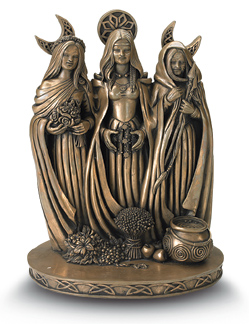Various searches that derive from the word 'Pagan' include:
- Pagan Island
- Paganism
- Pagan Kingdom
Paganism
Paganism describes a group of contemporary religions based on a reverence for nature. These faiths draw on the traditional religions of indigenous peoples throughout the world.
Indigenous
Indigenous means: belonging to a certain place. With the rise of Christianity, Islam and Buddhism, ethnic religions came to be marginalized as "leftover" traditions in rural areas, referred to as paganism or shirk (idolatry).
- Paganism encompasses a diverse community.
- Wiccans, Druids, Shamans, Sacred Ecologists, Odinists and Heathens all make up parts of the Pagan community.
- Some groups concentrate on specific traditions or practices such as ecology, witchcraft, Celtic traditions or certain gods.
- Most Pagans share an ecological vision that comes from the Pagan belief in the organic vitality and spirituality of the natural world.
- Due to persecution and misrepresentation it is necessary to define what Pagans are not as well as what they are. Pagans are not sexual deviants, do not worship the devil, are not evil, do not practice 'black magic' and their practices do not involve harming people or animals.
Wiccans
Wicca is a Pagan Witchcraft tradition. Today, the name Wicca is frequently applied to the entire system of beliefs and practices that make up the spectrum of contemporary Pagan Witchcraft. However, although Wicca and Witchcraft are often used interchangeably, it is important to note that there are also Pagan Witchcraft traditions that are not Wiccan.
Wicca honours the Divine in the forms of the Triple Goddess, whose aspects of Virgin, Mother, and Wise Woman or Crone are associated with the waxing, full and waning phases of the Moon, and as the Horned God.
(More information on Wiccans: http://www.bbc.co.uk/religion/religions/paganism/subdivisions/wicca.shtml)
 |
| Figure 1 |
| Figure 2 |
List of Wiccan Gods: http://www.wicca-spirituality.com/wiccan-gods.html
Odinists and Heathens
Heathenry is a term used to describe the religious practices of two main groups of people, one historical and one modern.
The original Heathens were the pre-Christian North European peoples who lived a thousand and more years ago in the lands around what is now called the North Sea. These included the peoples of Anglo-Saxon England, Scandinavia, Germany and Frisia (Friesland).
Heathens work to build healthy relationships with gods and goddesses, ancestors, spirits of the land, and others in their communities, both through holy rites and through their day to day actions.Modern Heathen groups around the world are reviving these old practices and call their religion by various names including Asatru, The Northern Tradition, Odinism, Forn Sed, Germanic Pagan Reconstructionism or, simply, Heathenry. In Iceland, which did not convert to Christianity until the 11th Century, Heathenry has once again become an official (nationally recognised) religion.
(More information on Odinists and Heathens: http://www.bbc.co.uk/religion/religions/paganism/subdivisions/heathenry_1.shtml)
Practices
As Paganism is a very diverse religion with many distinct though related traditions, the forms of Pagan worship vary widely. It may be collective or solitary. It may consist of informal prayer or meditation, or of formal, structured rituals through which the participants affirm their deep spiritual connection with nature, honour their Gods and Goddesses, and celebrate the seasonal festivals of the turning year and the rites of passage of human life.
Beliefs
- Nature
The recognition of the divine in nature is at the heart of Pagan belief. Pagans are deeply aware of the natural world and see the power of the divine in the ongoing cycle of life and death. Most Pagans are eco-friendly, seeking to live in a way that minimises harm to the natural environment.
- Concepts of the divine
Pagans worship the divine in many different forms, through feminine as well as masculine imagery and also as without gender. The most important and widely recognised of these are the God and Goddess (or pantheons of God and Goddesses) whose annual cycle of procreation, giving birth and dying defines the Pagan year. Paganism strongly emphasises equality of the sexes. Women play a prominent role in the modern Pagan movement, and Goddess worship features in most Pagan ceremonies.
- Pagan theology
Paganism is not based on doctrine or liturgy. Many pagans believe 'if it harms none, do what you will'. Following this code, Pagan theology is based primarily on experience, with the aim of Pagan ritual being to make contact with the divine in the world that surrounds them.
bibliography
Paganism at a glance, information taken from: http://www.bbc.co.uk/religion/religions/paganism/ataglance/glance.shtml
Indigenous information taken from: http://en.wikipedia.org/wiki/Indigenous_religion
Pagan practices information taken from: http://www.bbc.co.uk/religion/religions/paganism/rites/worship.shtml
Pagan beliefs taken from: http://www.bbc.co.uk/religion/religions/paganism/beliefs/beliefs.shtml
Images
Figure 1 - http://cdn.gaelsong.com/images/uploads/148042_1878_large.jpg
Figure 2 - http://members.shaw.ca/bbogdan/blog_images/wicca/pentacle.JPG

No comments:
Post a Comment